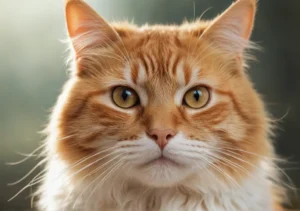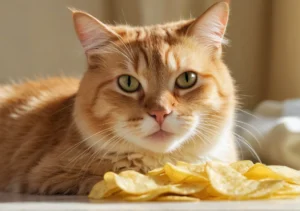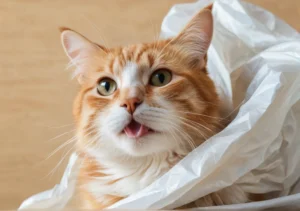Cats have a mysterious fascination with the sounds of kittens – but why exactly is that? Let’s explore the reasons behind this intriguing behavior.
Evolutionary Instincts
Cats have an innate attraction to kitten sounds that can be traced back to their evolutionary instincts. As natural hunters, cats are wired to respond to high-pitched sounds that resemble the distress calls of vulnerable young kittens. This instinctual response is deeply rooted in their history as both hunters and caregivers in the wild.
When a cat hears the mewling of a kitten, it triggers a primal urge to investigate and protect the source of the sound. In the wild, this behavior would help ensure the survival of the feline species by caring for and safeguarding the next generation. Even domesticated cats retain this instinctual response to kitten sounds, as it is ingrained in their genetic makeup.
Sound Recognition
Cats possess remarkable sound recognition abilities that allow them to discern the subtle differences between kitten sounds and other noises in their environment. With their acute hearing, cats can pick up on the specific tonal qualities and frequencies of kitten cries, making it easy for them to identify and respond to the distress calls of young felines.
This heightened auditory sensitivity is a key survival trait for cats, enabling them to locate and protect vulnerable kittens in the wild. Their ability to distinguish between different sounds also helps them communicate effectively within their social groups and navigate their surroundings with precision.
Additional Unique Insight: Cats can even identify the individual vocal patterns of kittens, allowing them to recognize and bond with specific young members of their group based on their unique sounds.
By understanding how cats’ evolutionary instincts and advanced sound recognition abilities shape their responses to kitten sounds, we gain valuable insight into the complex world of feline behavior. These natural traits not only highlight the remarkable adaptations of cats as predators and caregivers but also deepen our appreciation for the intricacies of their communication and social interactions.
Social Behavior
Cats are naturally social animals, and their attraction to kitten sounds stems from their need for companionship and interaction within their feline community. Hearing kitten sounds can trigger a response in cats, drawing them towards the source of the sound in search of potential companionship. This social behavior reflects their instinctual desire to connect with others and form bonds within their social group.
Protective Instincts
When cats hear kitten sounds, their protective instincts are often triggered, leading them to investigate and provide care for the source of the sounds. This protective behavior is deeply ingrained in cats, as they are wired to ensure the safety and well-being of vulnerable members in their environment. Cats may feel compelled to approach and comfort the source of the kitten sounds, resembling a parental instinct to nurture and protect.
- Comforting Behavior: Cats may exhibit grooming behaviors towards the kitten source, displaying a nurturing and protective instinct.
- Bonding Opportunity: The interaction prompted by kitten sounds can strengthen social bonds between cats, fostering a sense of community and support within their group.
- Increased Alertness: The presence of kitten sounds can heighten a cat’s awareness of its surroundings, prompting a more vigilant and protective stance.
- Learning Opportunity: Cats can also learn valuable social skills and behaviors by interacting with kittens, enhancing their overall social intelligence.
Playful Curiosity
Cats are inherently curious creatures, and the sounds of kittens trigger their playful instincts. Just like how a new toy or a sudden movement can catch their attention, the high-pitched squeaks and mews of kittens are like an irresistible play invitation for adult cats. The unfamiliar sounds stimulate their curiosity, making them want to investigate and interact with the source. This natural inquisitiveness can lead to playful interactions between cats and kittens, fostering a sense of bonding and camaraderie in the feline world.
Psychological Comfort
Kitten sounds can also serve as a source of psychological comfort for cats, much like how a soothing lullaby can calm a human baby. The gentle, melodious tones emitted by kittens have been shown to have a calming effect on adult cats, potentially reducing their stress and anxiety levels in certain situations. This auditory stimulation can create a sense of security and relaxation for cats, providing them with a familiar and reassuring presence. So, the next time you hear your cat purring contentedly while listening to kitten sounds, know that it’s not just a coincidence – it’s their way of finding comfort in the sounds of their younger counterparts.
Training Opportunities
Did you know that kitten sounds can actually be used as a training tool for your cat? By playing recordings of kitten mews or purrs, you can encourage positive behavior in your feline friend. For example, you can play kitten sounds when your cat uses their scratching post instead of your furniture, reinforcing this desired action. This method can be especially effective for kittens who are still learning proper behaviors. So next time you catch your kitty doing something right, try playing some kitten sounds as a reward – it might just help reinforce that good behavior!
Environmental Enrichment
Exposing your cat to kitten sounds can do more than just entertain them – it can also enrich their environment and provide mental stimulation. Cats are naturally curious creatures, and the sound of kittens can engage their senses and keep their minds active. This can be especially beneficial for indoor cats who may not have as many opportunities for exploration and play. By incorporating kitten sounds into their environment, you can prevent boredom and help your cat lead a more fulfilling and enriched life. So go ahead and play some cute kitten sounds for your favorite feline friend – they’ll thank you for it with purrs and cuddles!
Additional Insight:
- Consider using interactive toys that make kitten sounds to keep your cat engaged and mentally stimulated. This can provide a fun and rewarding experience for your pet while also helping to prevent behavioral issues related to boredom.
Interesting Fact: Cross-Species Responses
Did you know that some cats not only respond to kitten sounds, but also to the sounds of other species’ babies? This showcases the complexity of their auditory capabilities and innate nurturing instincts. Cats’ ability to recognize and react to a variety of baby sounds demonstrates their sensitivity and adaptability to different vocal cues.
This cross-species response suggests that cats may have a broader range of communication skills than we initially thought. Their ability to understand and react to various types of baby sounds highlights the intricate nature of their auditory processing, making them even more fascinating and intelligent creatures than we may have realized.
Reasons for the Attraction
When it comes to why cats are so drawn to kitten sounds, there are a few key reasons at play. Firstly, the high-pitched, plaintive tones of kittens mimic distress calls, triggering a nurturing response in adult cats. This natural instinct drives them to investigate and provide comfort, as they would with their own offspring.
Additionally, kitten sounds often contain frequencies that are similar to those of prey animals, piquing cats’ hunting instincts. The combination of nurturing and predatory instincts makes kitten sounds particularly captivating to cats, prompting them to seek out the source and respond accordingly.
In conclusion, cats’ attraction to kitten sounds is a product of their innate nurturing and hunting instincts. Understanding these reasons can help us better comprehend and appreciate the intricate behaviors of our feline friends.
Alex, a passionate animal lover, has experience in training and understanding animal behavior. As a proud pet parent to two dogs and three cats, he founded AnimalReport.net to share insights from animal experts and expand his knowledge of the animal kingdom.




